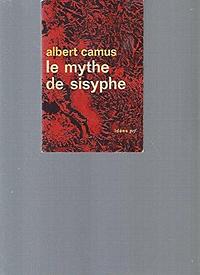You need to sign in or sign up before continuing.
Take a photo of a barcode or cover
dark
informative
reflective
Realmente Camus hubiese sido una persona (que como yo) estaría living con el Spot de Rosalia en Instagram de “Hazlo. Sin miedo, como puedas, con hambre, con gracia, con amor, riendo, llorando, en paz o peleándote... pero hazlo”.
(El q publicó en tiktok el vídeo del mito de Sísifo con el dinosaurio dando vueltas alrededor de una botella que sepa que muchas gracias)
(El q publicó en tiktok el vídeo del mito de Sísifo con el dinosaurio dando vueltas alrededor de una botella que sepa que muchas gracias)
informative
reflective
slow-paced
Has a special place in my heart and on my shelf, it is very interesting.
Was too depressing back then. Will pick up some other time I think.
challenging
informative
medium-paced
I'm not a philosopher and I'm not going to pretend I understood this book cover to cover. Without a strong understanding of schools of thought within the realm of existentialism in the early 20th century I have no idea how anyone would. Normally a book this short would have taken me a day to read, but this text was so dense that I was stuck on it all week.
So why read it? Well, I've always been fascinated by the optimistic cynicism of Camus. It has obviously had a massive cultural impact on the world and it is easy to resonate with a philosophy that calls for observing truth without hiding. The first chunk of the text is all about engaging with the ideas of other philosophers I haven't read, but I did catch onto Camus' disapproval of what he calls philosophical suicide. This is when an argument is logical right up until a point where the philosopher has to lean on faith or some other third party to intervene in the final outcome.
Essentially, he states that one can believe that life has no inherent meaning while still finding joy and happiness in the world. Maybe that didn't work out so great for him since he died so young, but then again maybe it did, who am I to say. I liked this book as an introduction to 20th century philosophy, especially because it felt so comparatively non-pretentious. It isn't for everyone, but I am glad I read it.
So why read it? Well, I've always been fascinated by the optimistic cynicism of Camus. It has obviously had a massive cultural impact on the world and it is easy to resonate with a philosophy that calls for observing truth without hiding. The first chunk of the text is all about engaging with the ideas of other philosophers I haven't read, but I did catch onto Camus' disapproval of what he calls philosophical suicide. This is when an argument is logical right up until a point where the philosopher has to lean on faith or some other third party to intervene in the final outcome.
Essentially, he states that one can believe that life has no inherent meaning while still finding joy and happiness in the world. Maybe that didn't work out so great for him since he died so young, but then again maybe it did, who am I to say. I liked this book as an introduction to 20th century philosophy, especially because it felt so comparatively non-pretentious. It isn't for everyone, but I am glad I read it.
challenging
inspiring
reflective
fast-paced
inspiring
medium-paced
challenging
medium-paced
Très intéressant à lire… Bravo Albert !
emotional
informative
reflective
slow-paced
Saggio meraviglioso. Peccato che molti autori spiegati e citati non li ho ancora letti quindi non sono riuscito ad apprezzare tutto al 100%.
"Bisogna immaginare Sisifo felice" è una delle frasi più forti che io abbia mai letto
"Bisogna immaginare Sisifo felice" è una delle frasi più forti che io abbia mai letto



